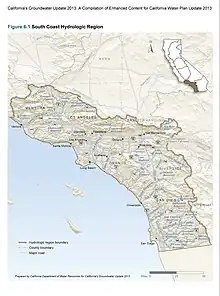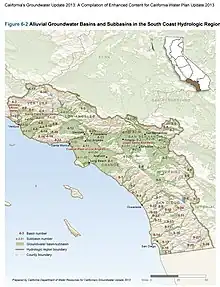

The South Coast hydrologic region of California is one of the 10 major hydrologic regions of the state as identified by the California Department of Water Resources. The South Coast hydrologic region has a surface area of about 11,100 sq mi (29,000 km2), and includes all of Orange County, major portions of Los Angeles, Riverside, San Bernardino, San Diego, and Ventura counties, and a small portion of Santa Barbara County.[1] The state-defined South Coast hydrologic region is roughly equivalent to the federally-defined Southern California Coastal water resource subregion. The South Coast hydrologic region has 78 state-recognized alluvial groundwater basins and subbasins.
Significant geographic features include the Transverse Ranges and the Peninsular Ranges. Major rivers in the region include the Los Angeles River, San Gabriel River, San Diego River, San Luis Rey River, Santa Ana River, Santa Clara River, Santa Margarita River, and Ventura River.
The climate in the region ranges from Mediterranean to subtropical steppe. Annual precipitation in the region ranges from more than 40 in (1,000 mm) in the mountains to less than 10 in (250 mm) in some valleys, with an overall average of 17.6 in (450 mm) for the region.
Alluvial groundwater basins in the South Coast hydrologic region
The South Coast hydrologic region overlies an aquifer with a number of identified alluvial groundwater basins and subbasins. An alluvial groundwater basin is essentially the top level of an aquifer, above less-permeable rocks below, such as limestone and shale.[2] Alluvium (from Latin alluvius, from alluere 'to wash against') is loose clay, silt, sand, or gravel that has been deposited by running water in a stream bed, on a floodplain, in an alluvial fan or beach, or in similar settings.[3]
| Alluvial groundwater basin[1] | State basin code[1] | Basin priority | Surface area (acres)[4] | Well yield (gpm) Maximum[4] | Well yield (gpm) Average[4] | Notes |
|---|---|---|---|---|---|---|
| Upper Ojai Valley groundwater basin | 4-1 | 3,800 | 200 | 50 | ||
| Ojai Valley groundwater basin | 4-2 | Medium | 6,830 | 600 | 383 | |
| Ventura River Valley groundwater Basin | 4-3 | 12,710 | ||||
| Santa Clara River Valley groundwater basin | 4-4 | High | ||||
| Acton Valley groundwater basin | 4-5 | 8,270 | 1,000 | 140 | ||
| Pleasant Valley groundwater basin | 4-6 | Medium | 21,600 | 1,000 | ||
| Arroyo Santa Rosa Valley groundwater basin | 4-7 | Medium | 3,740 | 1,200 | 950 | |
| Las Posas Valley groundwater basin | 4-8 | Medium | 42,200 | 750 | ||
| Simi Valley groundwater basin | 4-9 | 12,100 | 394 | |||
| Conejo Valley groundwater basin | 4-10 | 28,900 | 1,000 | 100 | ||
| Coastal Plain of Los Angeles groundwater basin[5] | 4-11 | High | ||||
| San Fernando Valley groundwater basin | 4-12 | High | 145,000 | 3,240 | 1,220 | |
| San Gabriel Valley groundwater basin | 4-13 | Medium | 154,000 | 4,850 | 1,000 | |
| Tierra Rejada groundwater basin | 4-15 | 4,390 | 1,200 | 172 | ||
| Hidden Valley groundwater basin | 4-16 | 2,210 | ||||
| Lockwood Valley groundwater basin | 4-17 | 21,800 | 350 | 25 | ||
| Hungry Valley groundwater basin | 4-18 | 5,310 | 28 | |||
| Thousand Oaks Area groundwater basin | 4-19 | 3,110 | 39 | |||
| Russell Valley groundwater basin | 4-20 | 3,100 | 25 | |||
| Malibu Valley groundwater basin | 4-22 | 613 | 1,060 | 1,030 | ||
| Raymond groundwater basin | 4-23 | High | 26,200 | 3,620 | 1,880 | |
| Coastal Plain of Orange County groundwater basin | 8-2 | High | 224,000 | 4,500 | 2,500 | |
| Upper Santa Ana River valley | 8-3 | |||||
| Elsinore groundwater basin | 8-4 | 25,700 | 5,400 | |||
| San Jacinto groundwater basin | 8-5 | High | 188,000 | |||
| Hemet Lake Valley groundwater basin | 8-6 | 16,700 | 820 | 196 | ||
| Big Meadows Valley groundwater basin | 8-7 | 14,200 | 120 | 34 | ||
| Seven Oaks Valley groundwater basin | 8-8 | 4,080 | ||||
| Bear Valley groundwater basin | 8-9 | Medium | 19,600 | 1,00 | 500 | |
| San Juan Valley groundwater basin | 9-1 | Medium | 16,700 | 1,000 | ||
| San Mateo Valley groundwater basin | 9-2 | 2,990 | ||||
| San Onofre Valley groundwater basin | 9-3 | 1,250 | ||||
| Santa Margarita Valley groundwater basin | 9-4 | Medium | 626 | 1,980 | ||
| Temecula Valley groundwater basin | 9-5 | High | 87,800 | 1,750 | ||
| Cahuilla Valley groundwater basin | 9-6 | Medium | 18,200 | 500 | ||
| San Luis Rey groundwater basin | 9-7 | Medium | 37,000 | 2,000 | 500 | |
| Warner Valley groundwater basin | 9-8 | 24,000 | 1,800 | 800 | ||
| Escondido Valley groundwater basin | 9-9 | 2,890 | 190 | 50 | ||
| San Pasqual Valley groundwater basin | 9-10 | Medium | 4,540 | 1,700 | 1,000 | |
| Santa Maria Valley groundwater basin | 9-11 | 12,300 | 500 | 36 | ||
| San Dieguito Creek groundwater basin | 9-12 | 3,560 | 1,800 | 700 | ||
| Poway Valley groundwater basin | 9-13 | 2,470 | 200 | 100 | ||
| Mission Valley groundwater basin | 9-14 | 7,350 | 1,000 | |||
| San Diego River Valley groundwater basin | 9-15 | Medium | 9,890 | 2,000 | ||
| El Cajon Valley groundwater basin | 9-16 | 7,160 | 300 | 50 | ||
| Sweetwater Valley groundwater basin | 9-17 | 5,290 | 1,500 | 300 | ||
| Otay Valley groundwater basin | 9-18 | 6,830 | 1,000 | 185 | ||
| Tijuana groundwater basin | 9-19 | 7,410 | 2,000 | 350 | ||
| Batiquitos Lagoon Valley groundwater basin | 9-22 | 741 | Batiquitos Lagoon | |||
| San Elijo Valley groundwater basin | 9-23 | 883 | 1,800 | |||
| Pamo Valley groundwater basin | 9-24 | 1,500 | ||||
| Ranchita Town Area groundwater basin | 9-25 | 3,130 | 125 | 22 | ||
| Cottonwood Valley groundwater basin | 9-26 | 3,850 | ||||
| Campo Valley groundwater basin | 9-27 | 3,550 | <40 | |||
| Potrero Valley groundwater basin | 9-28 | 2,020 | ||||
| San Marcos Area groundwater basin | 9-32 | 2,130 | 60 |
See also
References
- 1 2 3 "Bulletin 118 (South Coast, Chapter 6)" (PDF).
This article includes material published by the U.S. state of California that is believed to be in the public domain.
- ↑ US EPA, OLEM (2015-06-25). "Section 8: Ground Water - Aquifers". www.epa.gov. Retrieved 2023-03-20.
- ↑ Jackson, Julia A., ed. (1997). "alluvium". Glossary of geology (Fourth ed.). Alexandria, Virginia: American Geological Institute. ISBN 0922152349.
- 1 2 3 "Antelope Valley Watermaster" (PDF).
- ↑ California (1961). Planned utilization of ground water basins: Coastal Plain of Los Angeles County. Appendix A, Ground water geology. Bulletin ;no. 104, Appendix A. Sacramento.
{{cite book}}: CS1 maint: location missing publisher (link)